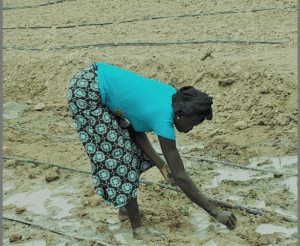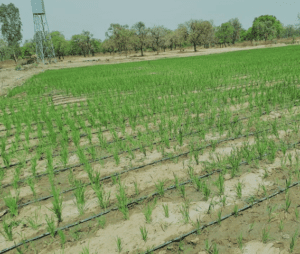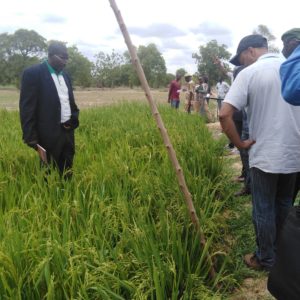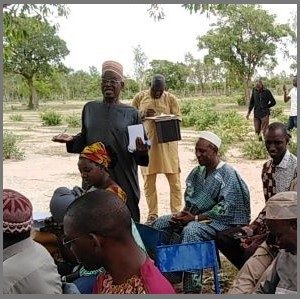A major food staple in many parts of the world, rice is a critical crop in Mali. Yet despite being the second-largest rice producer in West Africa, Mali still imports 10 percent of its rice, as gains in agricultural productivity are offset by the country’s fast-growing population, changing consumption norms, and rapid rural-to-urban migration.

Reliance on traditional flood irrigation techniques and tremendous fluctuations in annual precipitation have severely impacted Malian rice producers’ rain-fed and gravity-based systems. Climate change and water management issues have contributed to the Niger River—a primary water source for many rice farmers in Mali —recently reaching its lowest level in 30 years. In addition, projected temperature increases and the possible threat of a future drought further put Mali’s farmers and the food security of the country in a precarious position.
A new approach is needed for Mali to tackle these challenges. In response, Dexis has teamed up with Netafim, one of the largest drip irrigation companies in the world, and SOPROTRILAD, one of the biggest Malian rice processing and production companies operating in the conflict-prone central and northern parts of Mali, to pilot a project that examines the economic and agronomic feasibility of producing rice using drip irrigation. If successful, drip irrigation could boost rice yields by 40 to 50 percent, allow for year-round agricultural production, increase the income of Malian farmers, and ultimately, promote the nation’s food resilience.
Through this model, Dexis and our private sector partners seek to test drip irrigation as a climate-smart approach that can build the country’s sustainable agricultural productivity. This aligns directly with the Malian Government’s National Agricultural Investment Plan (NAIP) and USAID’s Global Food Security Strategy (GFSS) Country Plan for Mali, which includes the need to address Mali’s hunger, malnutrition, and poverty through research-derived innovations. The GFSS specifically calls for better irrigation practices, including improved water conservation and irrigation efficiency, to help strengthen the long-term resilience of Mali’s people and systems “in the face of a wide range of current and future climate scenarios.”
Installing drip irrigation requires only a few basic elements: a source of water, a method to pressurize it, a nursery to start the rice plants, and drip tape/emitters. The final step in planting the fields is getting the ground moist and transplanting the rice plants. Based on our research and experience, Dexis expects yields to be substantially higher than with flood irrigation, which we predict will offset costs of installing drip irrigation.
The environmental benefits of this technique are clear and substantial: reduced water use, fewer emissions of methane associated with flood irrigation, and more efficient use of resources in rice production. The big question is, does it make financial sense for Mali?

Dexis believes that engaging private sector players to tackle development challenges positions interventions like this for long-term sustainability. In the coming months, Dexis and its partners are undertaking a series of agronomic, environmental, and economic studies that will show how drip irrigation can be successful in Mali and under what circumstances it can be economically viable.
As a learning organization, Dexis conducts research not only to promote positive results, but to show when approaches don’t work. This allows us to work with our partners to refine and adjust our projects as needed. Dexis intends to host a field day in Mali at the project site in the last week of June, and other events to share what we’re learning about drip irrigation and its potential for rice production in Mali.
Our pilot is well underway to test our approach. If successful, it can help Malian rice farmers take advantage of increased productivity and build their resilience and economic prosperity. We believe the discussion of drip irrigation will be important for Mali as it moves forward to face the challenges of climate change and producing food for a growing population.
Field Day Update

On June 27, 2019, Dexis, SOPROTRILAD, and Netafim hosted a field day for its drip irrigation pilot project in Mali. A total of 54 individuals participated in the event, including members of the Ministry of Agriculture, non-governmental organizations, local Netafim representatives, local members of the press, and private sector representatives. The purpose of the field day was to demonstrate the results of the pilot thus far and its potential for rice production in Mali. The event also provided an opportunity for networking and learning from each other’s experiences. This included the Agricultural Bank of Mali (BNDA) and Netafim’s local partners discussing the measures needed to improve access to credit for farmers interested in drip irrigation. Increased access to credit is particularly important to the 8,000 farmers who supply SOPROTRILAD with rice paddy for milling, given their location between Mopti and Timbuktu. This area has had serious security issues, and continued economic growth is particularly important in fighting the root causes of insecurity.
As rainfall becomes increasingly unpredictable in Mali, it will be more important than ever to have a system that can reduce water use, decrease fertilizer use, increase yields, and lower the amount of carbon emissions into the atmosphere. Participants were eager to see the results of this agronomic and economic test in order to contribute to the growth of this new irrigation technology.

While the final results of the project will not be ready until the final harvest in several months, participants were impressed with the large potential yields of the rice in these fields; the lower amounts of water used by the drip system compared to the more common practice of flooding the fields; the efficient application of fertilizer through a “fertigation” system that applies fertilizer directly to the plants; and the minimal presence of weeds. There were concerns about the cost of the drip infrastructure and if this system would be profitable. Dexis is now working with SOPROTRILAD technicians to complete an economic feasibility analysis of the project, determine its yields of rice, and compare them to traditional production and yields.


